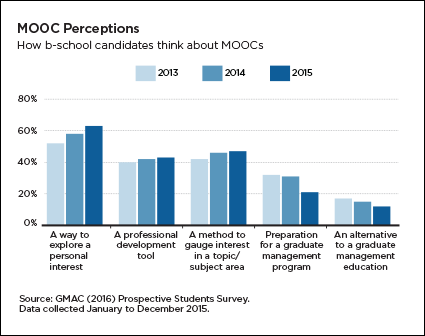Survey data reveal shifting perceptions of MOOCs since they first grabbed the spotlight in 2012.

Though the first MOOC (massive open online course) was developed in 2008, it wasn’t until 2012 that the concept received significant media attention and captured widespread popular interest. By then, many of the major MOOC providers—including Coursera, Udacity, and edX—had launched and boasted enrollment numbers that turned heads across higher education.
Google searches for “MOOC” rose rapidly, and The New York Times declared it
“The Year of the MOOC”. Graduate business schools around the world wondered if this was the leading edge of a change that would transform the industry, and many feared that candidates would begin to view MOOCs as a viable alternative to their degree programs.
Data from the 2016 mba.com Prospective Students Survey indicate that these fears have not become reality. Although candidate use of MOOCs has grown modestly, the percentage who see it as an alternative to a graduate management program—or even as a way to prepare for a program—is trending down.
Overall, the share of business school candidates who enrolled in and completed a MOOC rose slightly between 2013 and 2015. During this period, the percentage of candidates who enrolled in a MOOC grew from 16 percent to 20 percent, and the share who completed a MOOC grew from 6 percent to 9 percent.
Among candidates who are familiar with MOOCs, their perceptions of what they can be used for have shifted over this three-year period. About 2 in 3 business school candidates (63%) surveyed in 2015 characterized MOOCs as a way to explore a personal interest—up from 52 percent in 2013. The share of candidates who view MOOCs as a way to gauge interest in a topic or subject also grew over this period, from 42 percent to 47 percent. The share who see MOOCs as a professional development tool also rose slightly, from 40 percent to 43 percent.

Trending in the opposite direction is the share of candidates who view MOOCs as a way to prepare for a graduate management program (32% in 2013 vs. 21% in 2015) and the share who view them as an alternative to a graduate business degree (17% in 2013 vs. 12% in 2015). The key takeaway is that while MOOCs are slowly becoming more popular among business school candidates, MOOCs are not seen as a substitute for a master’s degree in business in large numbers.
For more on the prospective student mindset—including school selection criteria, information sources, and career goals—download the 2016 mba.com Prospective Students Survey Report.